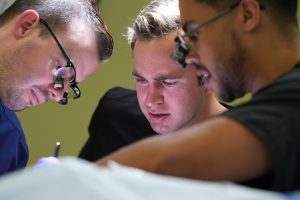BME Collaboration – Immersion Program
Immersion program connects biomedical engineering students with clinical faculty
By Jill Jansen, Jill Jansen Communications, Inc .
 The Department of Otolaryngology—Head and Neck Surgery has established an immersion program to provide students from the Weldon School of Bioengineering at Purdue University with opportunities to learn about clinical otolaryngology practice. In July, eight Purdue students participated in a two-week immersion program, beginning with participation in the department’s Annual Course on Anatomy and Histopathology of the Head, Neck and Temporal Bone. The course included lectures from department faculty and other clinical experts, complemented by a cadaver lab and other hands-on experiences. During the second week of the program, the students engaged in shadowing rotations focused on procedures discussed during the first week of the program. The students also attended lectures from medical device representatives who shared industry perspectives on clinical otolaryngology practice.
The Department of Otolaryngology—Head and Neck Surgery has established an immersion program to provide students from the Weldon School of Bioengineering at Purdue University with opportunities to learn about clinical otolaryngology practice. In July, eight Purdue students participated in a two-week immersion program, beginning with participation in the department’s Annual Course on Anatomy and Histopathology of the Head, Neck and Temporal Bone. The course included lectures from department faculty and other clinical experts, complemented by a cadaver lab and other hands-on experiences. During the second week of the program, the students engaged in shadowing rotations focused on procedures discussed during the first week of the program. The students also attended lectures from medical device representatives who shared industry perspectives on clinical otolaryngology practice.
“The opportunity to see what’s happening in the OR and how clinicians are using devices really helped mold my perspective from an engineering standpoint on how devices can be developed, improved and applied in the clinical setting,” said Josh Sexton, a senior biomedical engineering student who serves as a student liaison for the immersion program. “The goal with the immersion program is to emphasize to students the value of collaborations and communication between engineers and clinicians.”
In addition to the two-week summer program, the department is organizing year-round opportunities for students to shadow otolaryngology faculty and learn more about clinical and patient care needs in the field.
“When the students come to the OR, we talk to them about the issues we have, what is working with the technology, how we use it and what problems we’d like to solve,” said Vijay Ramakrishnan, MD, one of the faculty members who is helping to facilitate the immersion program. “We like to discuss not only the problems we face today, but what we think we’re going to need 10 or 20 years from now when these students are working as biomedical engineers. Innovation takes time, and forging these connections early adds a lot of value.”
More than 50 biomedical engineering students have applied to participate in the Department of Otolaryngology—Head and Neck Surgery’s immersion program.
